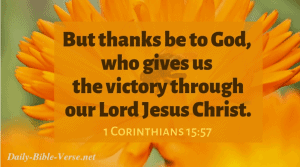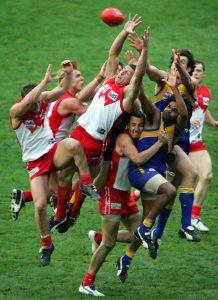A sermon on 1 Corinthians 15:35-58 by Rev Richard Keith on Sunday 7 June 2020
When it comes to the end of life and to the fate of the dearly departed, people believe in a lot of comforting lies. For example, a few years ago a boy in my Scripture class came up to me and said, “Mr Keith, my Nana took me outside last night and pointed up and said, “See that star. That’s your Pop. When he died, God made him a star.” So, Mr Keith, is my Nana right? Is my Pop a star?” Now this boy’s Nana was one of my church’s members. I was pretty sure that whatever she would be told whatever I said to her. But it was a comforting lie.
Here’s another example. Some people believe that when we die, we become angels. Now, if you are looking forward to growing wings and to flying around in the clouds, I hate to break it to you, but angels are angels and people are people. Angels are the servants of God through whom God performs his wonders in the world, both natural and supernatural. People, on the other hand, are people, human beings like us, who possess a glorious origin, an extraordinary destiny, a powerful calling, and a poor track record. We have been made in the image of God, and yet with our actions and choices every day we blur and disfigure that image. It’s time to admit it: we are no angels.
But Jesus Christ, the eternal Son of God, became like us. He didn’t fly with wings, but he walked with legs. When we had strayed and sold ourselves to sin, he shed his blood on the cross to buy us back. And he didn’t do it so that we would become something we’re not. He gave his life so that we would become who we truly are.
We are near the end of our messages on the Apostles’ Creed. And the end of the Creed wants to reassure us that the end of our life on earth is not the end of us and that God’s gift of life will not be trumped by the march of death. Because, if the heart of the gospel is that Jesus Christ is Lord, then the good news announces that his victory and lordship means that judgment is judged, hell is thrown into hell, and death has been swallowed up by life.
The second last clause in the Apostles’ Creed says, “I believe in the resurrection of the body.” And it answers the questions, What will I become when I die? Who will I be? You won’t be a star. You won’t be an angel. You will be you. Transformed, perfected, and made new. But still you.
In our reading from 1 Corinthians chapter 15, we see two separate strands woven together. The first strand highlights the difference between our earthly body and our resurrection body. In verses 35 to 37, the apostle Paul writes,
But someone may ask, “How are the dead raised? With what kind of body will they come?” How foolish! What you sow does not come to life unless it dies. When you sow, you do not plant the body that will be, but just a seed, perhaps of wheat or of something else.
His key point is that every change, every transformation contains a loss. A seed becomes a plant. A girl becomes a woman. And in the process something is left behind. For example, you haven’t known me for long, but over my lifetime I have changed. I used to eat a lot more dirt and a lot less pumpkin than I do today. I used to have a lot more hair and now I have a lot more experience. But in this transformation there have been losses along the way. Wisdom has come at the cost of stamina. Experience has come at the cost of innocence. Although it is still me, and there are hints of me even in photos of me as a baby, I am not the same me.
In the same way, when I am raised to life on the last day, when Christ returns to judge the living and the dead, I will be me, but I will not be the same me. In verses 42 and 43, Paul says,
The body that is sown is perishable, it is raised imperishable; it is sown in dishonour, it is raised in glory, it is sown in in weakness, it is raised in power; it is sown a natural body, it is raised a spiritual body.
In this sentence, Paul develops the image of a seed. A wheat seed and a wheat plant may both be wheat, but you wouldn’t confuse the one with the other. The seed can survive in the dark for months or years, in conditions in which the plant would wither and die. The seed can remain safe and all alone, but if it never changes, it will never achieve its true purpose. However, when it is the sown, it dies and is transformed into the plant that can live and grow and produce hundreds of seeds.
In the same way, in the resurrection we will be transformed. We will not be trapped forever in a body that is prone to weakness and sin, but one that fulfils our true purpose, renewed in power and strength, restored and healed, made new in the image of Christ, who became like us so that we may become like him. Not in a body that is suited to an environment of decay and disease, but one that is suited to an environment of glory and honour. One that does not perish, but endures. One that does not age, but is forever young. Flesh and blood cannot inherit the kingdom of God. And so to survive in the environment of God’s eternal kingdom, we will be changed. We will put on imperishability like a tie and immortality like a coat. And then we will have the last laugh with God at the defeat of all his enemies, at sin and death which seem to consume all that God has made good, but which will themselves be consumed in the complete victory of God. And all that we have lost in this life, all the griefs that we have endured, all that we have left behind will be made good. And we will sing, “Death has been swallowed up in victory. Where, O death, is your victory? Where, O death, is your sting?
We cannot attain to that glory, until we are changed. Otherwise we will be condemned to our weakness forever. And so resurrection is about being set free from all those limitations. Because to believe in the resurrection of the body means to believe that God’s victory will triumph even at the core of who we are.
That is the first of the two strands in this passage of Scripture. The second strand, woven into the first, assumes a continuity of our resurrection body with our earthly body. The seed and the plant are both wheat. The boy and the man are the same person. The earthly body must take off mortality and put on immortality, but it is like the same person changing clothes. What we call eternal life is not about escaping from who I really am in order to become something I’m not. It’s about God making me the best me that I could possibly be. It’s about healing what is damaged in me and making whole what has been broken. It’s about fulfilling what I was made to be. To believe in the resurrection of the body means to believe that what will be raised to life when Christ returns is me. So that I myself may experience the glory of God’s eternal kingdom. I am not going to become a star. I am not going to grow wings and turn into something I’m not. I will live a true, perfect, restored human life. Not as a bodiless soul haunting heaven like a ghost. But as a true human being in the new earth and the new heaven.
The hope of the resurrection reminds us that the world is not a hell that has been designed to punish you, and that your body is not a prison that your soul needs to escape. Our world is God’s good creation that has been broken and we are people who have all been damaged in different ways and to different extents. And that’s why our souls, the core of our being, the heart of who we really are, does not long for release, but longs to be made right in a truly human life. Different to what we know now. Transformed in radial ways. But still recongnisably human and still recongisably us.
That’s what we see in the risen life of Jesus. No regular person could appear among them as suddenly as he did. That’s why when they saw him they immediately assumed that he was a ghost, like was his bodiless spirit. But they were wrong. It was really him. They could recognise him and when he showed them his hands and his feet, he was showing them his wounds from the nails of the cross. Still visible but healed. And to clinch the deal, he asked for something to eat, which no ghost could or would do. It was the same Jesus who had walked and talked with them, whom they had left everything to follow. But Jesus was not the same. He had shrugged off our weakness and mortality and appeared instead in heavenly glory.
This is what the gospel promises., this is what my heart desires: to be the same me, but just not the same. But to be like Jesus.
The very last thing I want to say is that this future hope inspires my present action. Paul finishes off chapter 15 with these words:
Thanks be to God! He gives us the victory through our Lord Jesus Christ. Therefore, my dear brothers and sisters stand firm. Let nothing move you. Always give yourselves fully to the work of the Lord, because you know that your labour in the Lord is not in vain.
It is not true that Christians are too heavenly minded to be any earthly use. Instead, God’s future victory that will restore me to be who I am meant to be, inspires me in my earthly service. Ministry is hard. It’s work. It is labour. But every second of every day, whatever it costs, is worth it. Because we are playing on the winning team.
Here’s a picture from the past.
It’s the last minute of the 2005 AFL Grand Final. The Swans are leading by one point with seconds to go, but the ball is in the wrong end of the field. Everyone is tired. And if the West Coast Eagles get the ball and score, they will win. But Swans defender Leo Barry finds enough to make the jump and to take the mark that defends the goal and wins the game. Where does the energy come from? He’s on the winning team. And that extra effort when everything is spent is worth it. That’s what it means to believe in the resurrection of the body. It means to believe in the victory of God and that that victory includes you. All of you. Every bit of you. The whole of you. And it makes any extra effort for the kingdom of God worth it.
And that, my friends, is not a comforting lie. It is the empowering truth.


